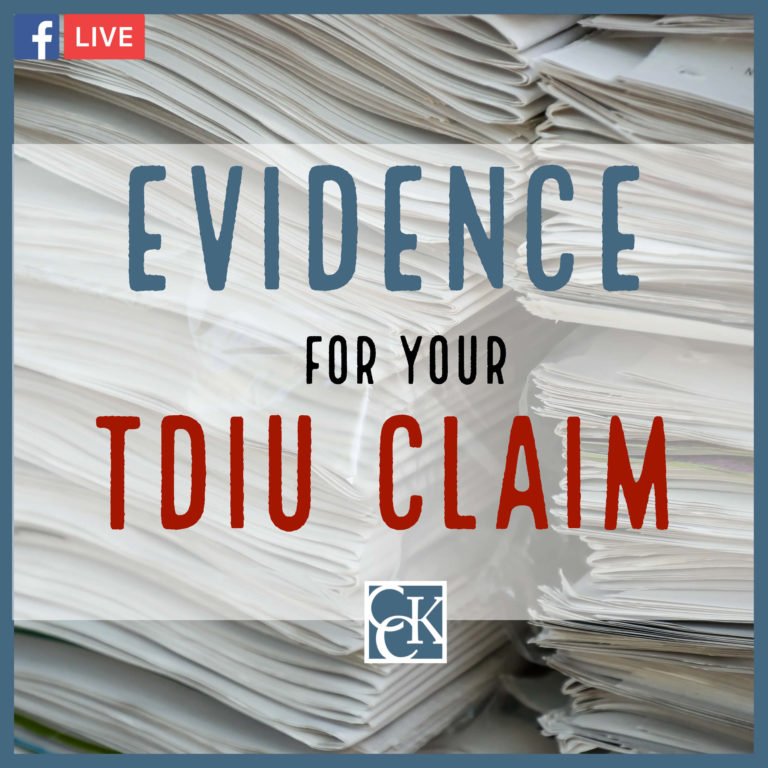Evidence for Your VA Individual Unemployability Claim

CCK Law: Our Vital Role in Veterans Law
During this week’s Facebook LIVE broadcast CCK partner Barbara Cook, attorney Maura Clancy, and Michelle Detore discuss the forms of evidence veterans can use to build a strong case for entitlement to individual unemployability benefits (TDIU).

What is Total Disability based on Individual Unemployability (TDIU)?
Total Disability based on Individual Unemployability (TDIU) is a benefit offered by the Department of Veterans Affairs to veterans who are left unable to maintain substantially gainful employment as a result of service-connected disabilities.
There are two ways in which veterans can qualify for individual unemployability as outlined in 38 CFR §4.16a and §4.16b: they can meet schedular requirements or be granted extraschedular TDIU. Veterans who qualify for schedular individual unemployability must either:
- Have one disability rated at least 60%; or
- Have multiple disabilities that combine to at least 70%, with at least one disability rated at 40%.
Veterans who do not meet the requirements above may qualify for extraschedular TDIU. In this event, the veteran’s file is sent to the Director of Compensation Service to determine if they are unemployable due to service-connected disabilities.
What do you need to prove for an individual unemployability claim?
When seeking individual unemployability benefits from VA, veterans must show that their service-connected disabilities prevent them from obtaining or following substantially gainful employment. VA describes a substantially gainful occupation as one that yields an annual income above the federal poverty threshold for one person. There are certain exceptions to this rule, however, which we will discuss later in this post.
Evidence for your TDIU Claim
There are many forms of evidence that can be used to support entitlement to VA individual unemployability benefits, ranging from Social Security determinations to medical opinions.
VA Form 21-8940
The VA Form 21-8940: Veteran’s Application for Increased Compensation Based on Unemployability is the formal application for individual unemployability benefits. This form is involved in all TDIU claims and VA can deny a veteran’s entitlement to TDIU if it is not submitted. This form asks for information that VA uses to determine if a veteran is unemployable, such as t history of the veteran’s last 5 years of employment, when the veteran stopped working, educational history, and what conditions impact their ability to work full time. Anytime a veteran wishes to raise individual unemployability as part of their claim or appeal, they are required to complete this form.
Often, we find a common error in VA’s adjudication of TDIU claims: VA considers the submission of the 21-8940 to be a new claim, rather than part in parcel to that of a previously submitted increased rating claim. This can negatively affect a veteran’s effective date.
VA Form 21-4192
Anytime a veteran submits a VA Form 21-8940, a subsequent VA Form 21-4192: Request for Employment Information in Connection with Claim for Disability Benefits will be sent out to each former employer listed on the 21-8940. This form is intended to get information about employment such as when the veteran stopped working, why they stopped working, how much they worked prior to leaving, whether the veteran was experiencing issues at work, and so on.
There are some things to keep in mind when it comes to this form. Many times, veterans applying for TDIU have been out of work for a while and their former employer could be out of business. In this case, VA will still send a 21-4192 to the employer but the veteran will also receive a copy. If you are a veteran in this circumstance who knows that their former employer is no longer in business, it is in your best interest to inform VA that this information is unavailable.
It is also important to keep in mind that some employers will not readily release this information without your consent. If you are aware that your former employer is still in business after recently applying for individual unemployability, consider calling them to ask if they will need a consent form signed.
If VA is unable to obtain this information, they will usually notify the veteran. In this case, a letter to VA from the veteran explaining the circumstances behind the situation can be helpful. Informing VA of these circumstances can prevent further delay in the adjudication of a claim, as VA will no longer spend time seeking this information.
Note: VA cannot deny a veteran’s claim for TDIU if the VA Form 21-4192 is not returned.
Social Security Determinations
Veterans can use their receipt of Social Security Disability Insurance (SSDI) and Supplemental Security Income (SSI) as evidence to support their VA claim for individual unemployability benefits; in fact, VA is actually required to consider this as evidence. Social Security and VA both share the goal of determining whether a person is unable to work, although VA is only concerned with service-connected disabilities. So, if a veteran is receiving Social Security benefits for a service-connected condition, this could certainly be used as evidence in favor of entitlement to individual unemployability from VA.
Even if a veteran is receiving Social Security benefits for a non-service-connected condition, VA can not use this determination as grounds for denial. VA is only allowed to evaluate service-connected conditions and the impact they alone have on the veteran’s ability to work. Simply because a non-service-connected disability prevents a veteran from working, does not preclude the possibility that their service-connected conditions impact their ability to work as well.
Vocational Evidence
Although VA has clearly defined the financial qualifications for individual unemployability, they have not defined the physical and mental acts required to maintain gainful employment. This is where the option of a vocational expert can be helpful. Vocational experts match all of the veteran’s described limitations to what they believe the requirements of employment are. For example, a vocational expert may reference the definition of sedentary work in the Dictionary of Occupational Titles to find that sedentary work requires a person to be able to lift ten pounds. If a veteran is only able to lift five pounds, the vocational expert may conclude that this particular veteran can not meet the basic needs of a sedentary occupation, and therefore cannot follow substantially gainful employment. Vocational experts will also consider factors such as reliability, concentration, and productivity in order to form an opinion about whether a veteran can work in a competitive work environment given their limits.
Vocational evidence can be particularly compelling because it can provide a wider scope of the veteran’s limitations that may not otherwise be mentioned in medical examinations. This is because during VA’s compensation and pension examinations, VA is often observing just one disability due to the qualifications of that examiner; for example, an orthopedic physician examining a veteran’s knee condition cannot also evaluate the veteran’s PTSD because they are not qualified to do so. Since many veterans have multiple disabilities, a vocational opinion can show the limitations these disabilities present when in combination with one another.
In order to form these opinions, vocational experts will consider all evidence that competently and credibly portrays a veteran’s limitations. These pieces of evidence can include lay statements, medical records, or the terminology included in the diagnostic code by which the veteran is rated. For example, a veteran with a 70% psychiatric rating is considered to have “deficiencies in most areas, such as work, school, family relations…” according to the rating schedule; a vocational expert can use this language to show the veteran will likely struggle to maintain a job.
Vocational Rehabilitation and Employment Service Records
Records from VA’s Vocational Rehabilitation and Employment (VR&E) can be favorable evidence in many cases and readily available for veterans seeking individual unemployability benefits to access. Veterans can apply for this program when looking to rejoin the workforce with a service-connected disability. Sometimes this program finds that the veteran is not able to be rehabilitated, which can prove to be favorable evidence in a claim for individual unemployability benefits.
Medical Opinions
Medical opinions from professionals such as doctors, nurses, psychologists, etc. hold a lot of value in determining whether a veteran is entitled to receive TDIU. This is because medical opinions actually list the physical or cognitive limitations the veteran is facing. For example, a medical opinion will definitively state that the veteran has a limited ability to stay seated, to walk, or grasp items.
Lay Statements
Lay statements can be very beneficial to any VA disability claim, plus they are free, simple to acquire, and veterans may submit as many as they would like. Lay evidence is a written statement(s) from the veteran him or herself, or people who witness the limitations the veteran faces every day— such as a spouse, family member, or former coworker. These lay statements often provide valuable insight about the veteran’s disability that is not conveyed through other evidence, and VA is required to consider it.
Within the lay statements, be sure that the individual explains how they know the extent of your disability. For example, if a veteran’s spouse submits a lay statement they should explain how long they have been married to the veteran and how often they are together. Adding this detail can ensure VA does not deem that piece of lay evidence as too vague or unusable during adjudication.
Can I still work and collect individual unemployability benefits?
Certain instances exist in which veterans can work full-time and collect TDIU benefits. If a veteran’s occupation is not substantially gainful or they work in a protected work environment, eligibility for individual unemployability benefits will be maintained.
Marginal Employment
According to VA’s regulations, marginal employment is not considered to be substantially gainful. Marginal employment is a job that pays below the federal poverty threshold. It is important to document and show VA that your employment is marginal. The best way of doing this is to acquire your Social Security Earnings History Report, which shows how much you’ve earned in a given year. Your tax returns can also provide this information.
Protected Work Environment
Although VA has yet to define precisely what a protected work environment is, we look at it as an employer making unreasonable accommodations that allow the veteran to work there, other than what is required under law. For example, a veteran in a protected work environment may be able to arrive late to work more frequently than what is afforded to their peers. Veterans working in a protected work environment can earn above the poverty threshold and collect individual unemployability benefits simultaneously.
Is individual unemployability permanent?
Individual unemployability benefits are not considered to be permanent and total and can therefore be reduced or terminated if VA finds that the veteran’s condition has improved or they are participating in substantially gainful employment.
For example, VA regularly compares Social Security Administration income records with its list of TDIU veterans. If there is indication that a TDIU veteran had income higher than the federal poverty threshold, VA will send the veteran a VA Form 21-4140: Employment Questionnaire to see if they are working. (2024 update: This form used to be required on an annual basis, but that is no longer true.) If the veteran reports substantially gainful employment or does not respond to the VA Form 21-4140 request, their benefits will be at risk of a reduction or termination. Therefore, it is highly advised that TDIU veterans ensure that VA has accurate contact information and that they respond to VA Form 21-4140 requests promptly.
For more information and videos on TDIU, head over to our TDIU page.
About the Author
Share this Post

